Facebook is Openly Hostile to Smaller Platforms

Facebook is openly hostile to its own users. It blocks private messages with links to content Facebook does not approve of, and the types of content that are blocked or allowed, should greatly trouble people. They practically hold our data hostage, and have put considerable roadblocks in place over the past several years to make it more difficult to access information, even for developers. In 2014, they intentionally manipulated posts to make certain users more depressed1 in an experiment that should have made everyone reconsider their interactions with the network. On the surface, many casual users may not notice how Facebook’s hands have grown tighter around their walled garden of data, but for developers and content creators, the signs are everywhere and should trouble everyone.
Facebook Censors your Private Messages
Back in March of 2020, I sent a link to a friend over Facebook Messenger, referencing a post on a server called neckbeard.xyz. The message was blocked because my link violated Facebook’s community standards. Neckbeard is a small, Pleroma server. It runs no advertisements, hosts no illegal content, and connects to other independently run servers to form a community. The administrator of this server was completely unaware they had been explicitly blocked by Facebook.
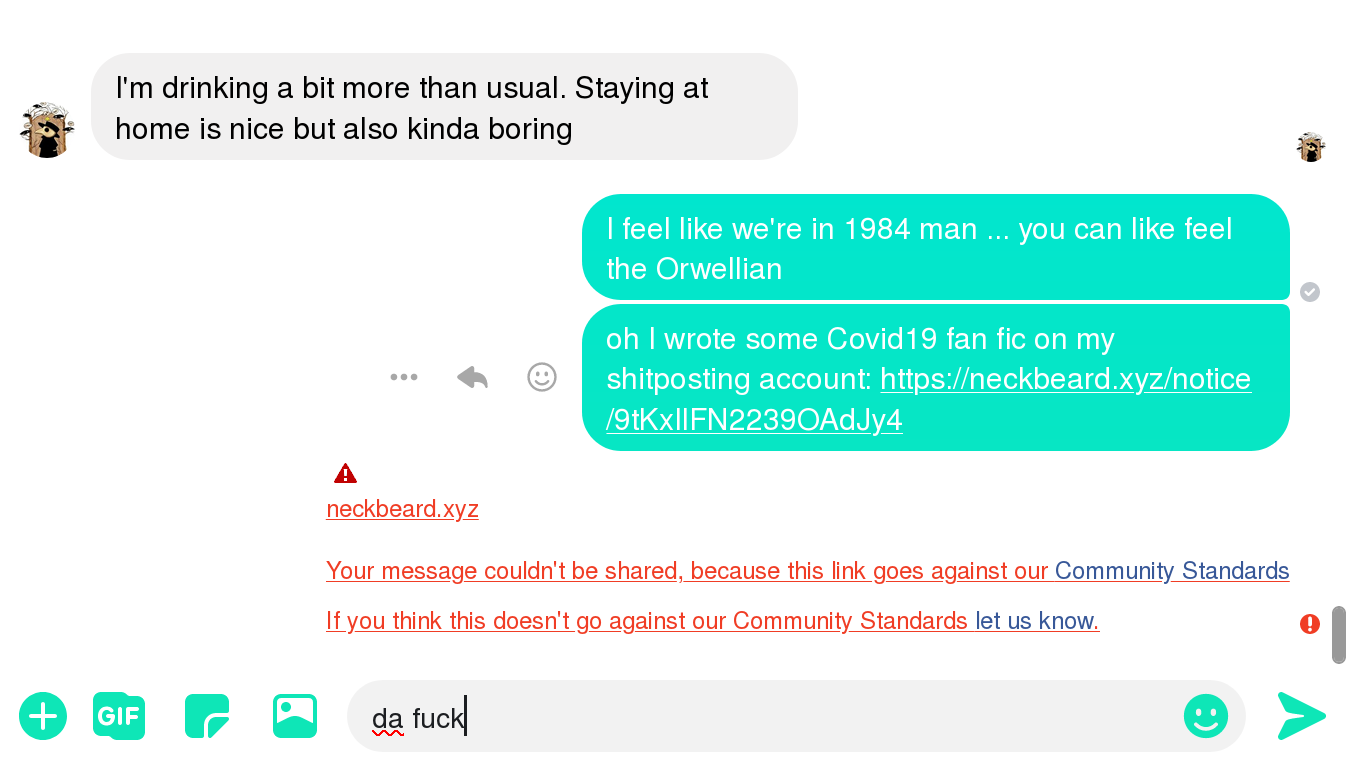
Neckbeard has some not safe for work content, but it’s all marked as such. It also is filled with memes, crude jokes and shitposters, so maybe Facebook is just protecting their community standards? Oh wait, Facebook allows links to PornHub.
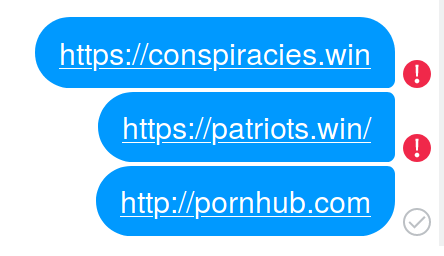
Facebook allows you to send other people porn hub links, but blocks links to conservative websites inside your private messages. Imagine if AT&T or Vodafone decided to block text messages based on their content? Would that be considered acceptable by customers? Of course not. It may even run afoul of legislation in many countries. The difference is that you pay for your telecommunication services. You don’t pay for Facebook. You are a cow on their dairy farm, and they sell your data to their real customers.
Thoughtcrime
On November 7th of last year, I wrote a post about the election. Shortly after, I was presented with a security warning that my account may have been compromised. After being forced to change my password, I was presented with a screen asking me if I wanted to delete my recent post. The message became very clear. Facebook was essentially asking me, “are you sure you want to share that post that’s critical of the election”, in what I can only describe as algorithmic driven gas-lighting.
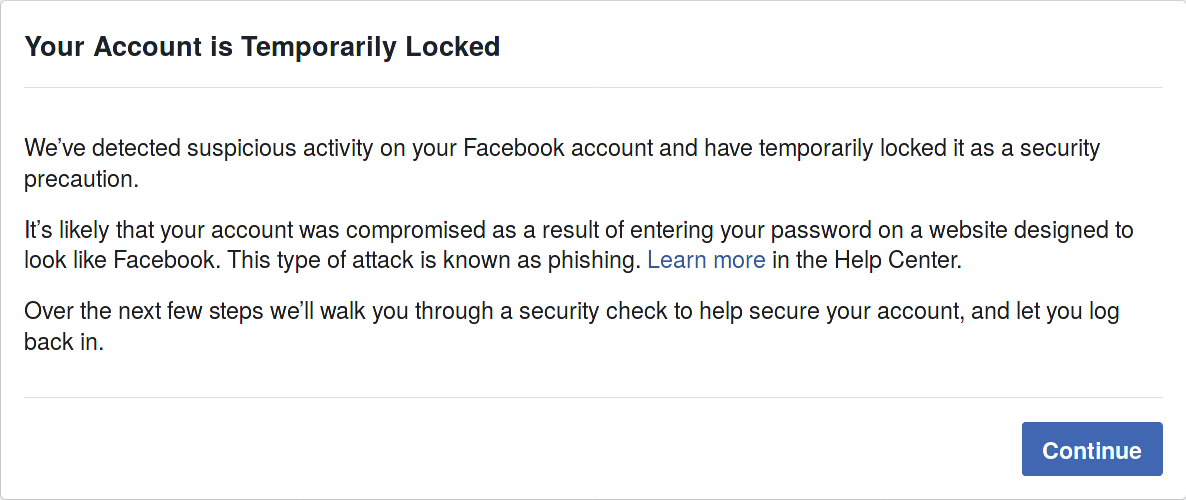
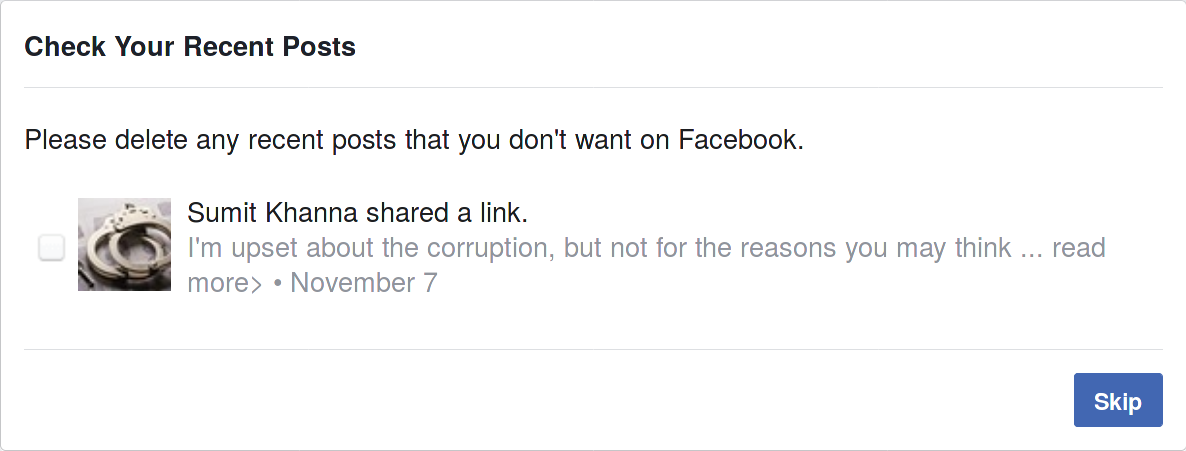
This was further validated when I looked at the page for my website, and that particular post had the boost button disabled.

Facebook Is Hostile to Developers
Within the events section of Facebook, there has always been an option to add Facebook events to your personal calendar. The link from this button provides a standard iCalendar download that can be used with most mobile calendar applications, or e-mail clients. Sometime around May in 2018, Facebook removed the ability for you to see all the events you’ve been invited to via this link2. Instead, users would be forced to go to Facebook’s website and accept those invitations before they’d show up in external calendars. In April, they further crippled their API by not letting users accept invitations from outside of their website and official apps3.
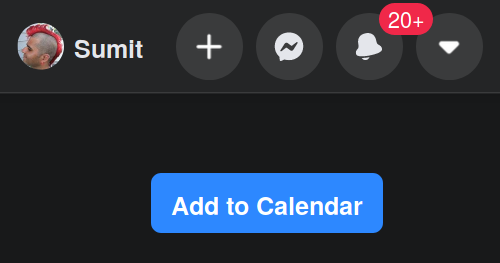
Facebook has no official API for their Messenger. In a previous post, I covered how I bridged Facebook Messenger to my Matrix server. Unfortunately, I constantly get disconnected from this bridge. Facebook detects my bridge as a potential attack, even though I pump all my Facebook connections through the same IP address the bridge uses. I’m forced to reset my password every single time I try to reconnect the bridge.

I’ve since given up trying to even use Facebook Messenger and have asked all the people I communicate with for alternative contacts such as phone numbers (SMS), Telegram and Signal. I can bridge all of those services with Matrix without any issue, giving me back control over my messaging.
Since May of 2015, it’s been impossible to get a friend list from the official GraphAPI. There is no way to get a list of your friends, other than the official website and Facebook app. This broke one of my scripts. Although the change may prevent future Cambridge Analytica style data extractions, it also prevents users from being able to use code to access their own data.
Walk Away
I’ve never really liked Facebook, or social media in general. I took pride in my own web presence; websites that I had built myself from the ground up. Facebook not only presents peoples’ information in cold, uniform posts, it also controls the timing and order that information is presented. Their platform is large enough that it can literally reshape how people think, and that should be of great concern to everyone.
The #deletefacebook campaign of 2018 was a failure because it was likely politically motivated. Except for a few major celebrities, there were no mass movements away from the platform. However, as more people are becoming increasingly aware at the tactics of Big Tech and their collaboration with Big Media to control thought narrative, I suspect more people will slowly trickle away from Facebook in the coming year.
Although there are people like Steven Crowder who have the resources necessary to sue Facebook4, as we’ve seen from the preliminary injunction between Parler and Amazon, the courts may be unwilling to grant relief even in egregious breaches of contract5. What is clear is that Facebook hates competition. With its acquisitions of Instagram, WhatsApp, Oculus and others, it has bought every up-and-coming sharing and messaging platform Zuckerberg could get his greedy hands on. Even after owning all the heavy hitters, it still blocks smaller platforms and has decimated conservative pages6.
The ultimate solution to social media is at the individual level, and it requires people putting in the effort to explore new, smaller, independently run forums. It was the birth and acceleration of technology, made accessible to everyone, that led to the explosive growth of the Internet in the late 90s and early 2000s. People who want to be free of control from their social media overlords need to explore the wild wilderness of the Internet the way we once did over a decade ago. The large platforms with their addictive alert bubbles and dopamine hits are afraid of independent sites slowly draining people away from their echo chambers. Ultimately the solution lies not in legislation, but in newer technologies and the inner human spirit that refuses to be controlled or submit.
-
Facebook deliberately made people sad. This ought to be the final straw. 30 Jun 2014. Hern. The Guardian. ↩
-
Facebook Graph gets all events that a user has been invited to. 6 May 2018. TomH. StackOverflow ↩
-
April 24, 2018 - Graph API. 24 April 2018. Facebook. ↩
-
Crowder SUES Facebook! 1 Feb 2021. Louder With Crowder. ↩
-
Amazon Wins Round #1 Against Parler. 22 Jan 2021. Viva Frei. ↩
-
Conservative #WalkAway Facebook page removed along with hundreds of thousands of videos and followers. 8 Jan 2021. Miller. Washington Examiner/MSN. ↩